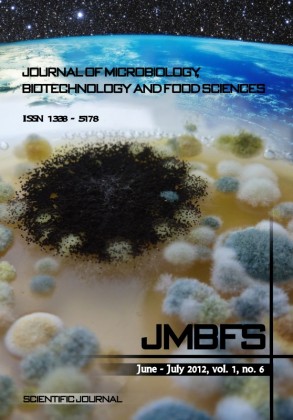THE IMPACT OF NONYLPHENOL (NP) ON THE SPERMATOZOA MOTILITY IN VITRO
Keywords:
endocrine disruptors, nonylphenol, spermatozoa motility, CASAAbstract
Nonylphenol (NP) is an environmental endocrine disruptor that has toxic, estrogenic and carcinogenic effects in fish, amphibians and mammals. NP can result in male reproductive dysfunction, altered testicular development, decreased male fertility and a decline of spermatozoa count. The target of this in vitro study was to determine the effect of NP on the spermatozoa motility. Specifically, we examined the dose- and time-dependent effect of nonylphenol (1, 10, 100 and 200 µg/mL) dissolved either in 0.1% dimethyl sulfoxide (DMSO) or 0.1% ethanol (ETOH) on the motility of bovine spermatozoa during several time periods (0 h, 2 h, 4 h and 6 h). The spermatozoa motility was determined by CASA (Computer Assisted Semen Analyzer) system using the Sperm VisionTM program. The results showed a decreased spermatozoa motility in all experimental groups with the addition of NP. Significant differences (P<0.001 and P<0.05) between the control group and all experimental groups were recorded. The lowest motility of bovine spermatozoa was found at doses > 100 µg/mL of NP in comparison with the control group. The obtained data indicate that the exposure to high doses of NP has the negative effect on spermatozoa motility.Downloads
Download data is not yet available.
Downloads
Published
2012-06-01
How to Cite
LukáÄová*, J., Kňažická, Z., Tvrdá, E., GreÅ„, A., LukáÄ, N., & Massányi, P. (2012). THE IMPACT OF NONYLPHENOL (NP) ON THE SPERMATOZOA MOTILITY IN VITRO. Journal of Microbiology, Biotechnology and Food Sciences, 1(6), 1551–1560. Retrieved from https://office2.jmbfs.org/index.php/JMBFS/article/view/7228
Issue
Section
Biotechnology
License
Copyright (c) 2012 Jana LukáÄová*, Zuzana Kňažická, Eva Tvrdá, Agnieszka GreÅ„, Norbert LukáÄ, Peter Massányi

This work is licensed under a Creative Commons Attribution 4.0 International License.
All papers published in the Journal of Microbiology, Biotechnology and Food Sciences are published under a CC-BY licence (CC-BY 4.0). Published materials can be shared (copy and redistribute the material in any medium or format) and adapted (remix, transform, and build upon the material for any purpose, even commercially) with specifying the author(s).

